 Libri di Daly Herman E. su Unilibro.it) Libri di Daly Herman E. su Unilibro.it)
|
|
2022 |
 Title :
Lo stato stazionario. L'economia dell'equilibrio biofisico e della crescita morale
Title :
Lo stato stazionario. L'economia dell'equilibrio biofisico e della crescita moraleAuthor: Daly Herman E. Publisher: Lu.Ce A causa della crescita economica esponenziale dalla seconda guerra mondiale, ora viviamo in un mondo denso di ricchezze materiali, ma ci comportiamo ancora come se fosse vuoto, come se avessimo risorse abbondanti per un futuro indefinito. I presupposti fondanti dell'economia neoclassica, sviluppati in un mondo così diverso dall'attuale, non reggono più, poiché il peso aggregato della specie umana sta raggiungendo - e in alcuni casi, superando - i limiti della natura a livello locale, regionale e planetario. L'ossessione prevalente per la crescita economica ci mette sulla strada del collasso ecologico, sacrificando il sostentamento stesso del nostro benessere e della nostra sopravvivenza. Per invertire questa infausta traiettoria, dobbiamo passare a un'economia stazionaria focalizzata sullo sviluppo qualitativo, invece che sulla crescita quantitativa, e sull'interdipendenza dell'economia umana e dell'ecosfera globale. Sviluppare politiche e istituzioni per un'economia stazionaria ci richiederà di rivisitare la questione dello scopo e dei fini dell'economia. Questo il messaggio del libro che avete tra le mani: una vera e propria "rivoluzione copernicana" in economia. € 14,00
Scontato: € 13,30
|
|
|
1916 |
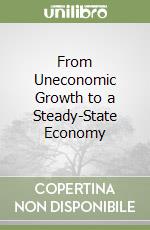 Title :
From Uneconomic Growth to a Steady-State Economy
Title :
From Uneconomic Growth to a Steady-State EconomyAuthor: Daly Herman E. Publisher: Edward Elgar Pub € 51,00
|
|
|
1910 |
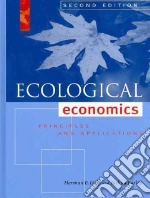 Title :
Ecological Economics
Title :
Ecological EconomicsAuthor: Daly Herman E., Farley Joshua Publisher: Island Pr In its first edition, this book helped to define the emerging field of ecological economics. This new edition surveys the field today. It incorporates all of the latest research findings and grounds economic inquiry in a more robust understanding of human needs and behavior. Humans and ecological systems, it argues, are inextricably bound together in complex and long-misunderstood ways. According to ecological economists, conventional economics does not reflect adequately the value of essential factors like clean air and water, species diversity, and social and generational equity. By excluding biophysical and social systems from their analyses, many conventional economists have overlooked problems of the increasing scale of human impacts and the inequitable distribution of resources. This introductory-level textbook is designed specifically to address this significant flaw in economic thought. The book describes a relatively new ?transdiscipline” that incorporates insights from the biological, physical, and social sciences. It provides students with a foundation in traditional neoclassical economic thought, but places that foundation within an interdisciplinary framework that embraces the linkages among economic growth, environmental degradation, and social inequity. In doing so, it presents a revolutionary way of viewing the world. The second edition of Ecological Economics provides a clear, readable, and easy-to-understand overview of a field of study that continues to grow in importance. It remains the only stand-alone textbook that offers a complete explanation of theory and practice in the discipline. € 90,30
|
|
|
2005 |
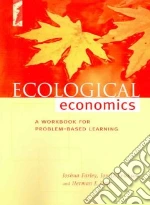 Title :
Ecoligcal Economics
Title :
Ecoligcal EconomicsAuthor: Farley Joshua, Erickson Jon D., Daly Herman E. Publisher: Island Pr Ecological economics addresses one of the fundamental flaws in conventional economics--its failure to consider biophysical and social reality in its analyses and equations. Ecological Economics: Principles and Applications is an introductory-level textbook that offers a pedagogically complete examination of this dynamic new field. As a workbook accompanying the text, this volume breaks new ground in applying the principles of ecological economics in a problem- or service-based learning setting. Both the textbook and this workbook are situated within a new interdisciplinary framework that embraces the linkages among economic growth, environmental degradation, and social inequity in an effort to guide policy in a way that respects fundamental human values. The workbook takes the approach a step further in placing ecological economic analysis within a systems perspective, in order to help students identify leverage points by which they can help to affect change. The workbook helps students to develop a practical, operational understanding of the principles and concepts explored in the text through real-world activities, and describes numerous case studies in which students have successfully completed projects. Ecological Economics: A Workbook for Problem-Based Learning represents an important new resource for undergraduate and graduate environmental studies courses focusing on economics, environmental policy, and environmental problem-solving. € 34,00
|
|
|
1997 |
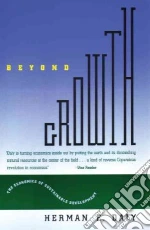 Title :
Beyond Growth
Title :
Beyond GrowthAuthor: Daly Herman E. Publisher: Beacon Pr Named one of a hundred "visionaries who could change your life" by the Utne Reader, Herman Daly has probably been the most prominent advocate of the need for a change in economic thinking in response to environmental crisis. An iconoclast economis t who has worked as a renegade insider at the World Bank in recent years, Daly has argued for overturning some basic economic assumptions. He has won a wide and growing reputation among a wide array of environmentalists, inside and outside the academy. In a book that will generate controversy, Daly turns his attention to the major environmental debate surrounding "sustainable development." Daly argues that the idea of sustainable development--which has become a catchword of environmentalism and international finance--is being used in ways that are vacuous, certainly wrong, and probably dangerous. The necessary solutions turn out to be muc h more radical than people suppose. This is a crucial updating of a major economist's work, and mandatory reading for people engaged in the debates about the environment. "Daly is turning economics inside out by putting the earth and its diminishing natural resources at the center of the field . . . a kind of reverse Copernican revolution in economics." --Utne Reader € 27,60
|
|
|
1994 |
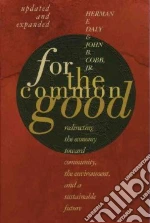 Title :
For the Common Good
Title :
For the Common GoodAuthor: Daly Herman E., Cobb John B. Publisher: Beacon Pr Winner of the Grawemeyer Award for Ideas Improving World Order 1992, Named New Options Best Political Book Economist Herman Daly and theologian John Cobb, Jr., demonstrate how conventional economics and a growth-oriented industrial economy have led us to the brink of environmental disaster, and show the possibility of a different future. Named as one of the Top 50 Sustainability Books by University of Cambridges Programme for Sustainability Leadership and Greenleaf Publishing. € 41,50
|